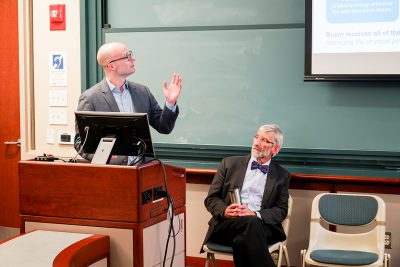
The Boston University Energy Club hosted a panel Tuesday to discuss the university’s recent landmark Power Purchase Agreement (PPA) with French electric utility company ENGIE.
The panel was composed of representatives from Sustainability@BU, ENGIE and Edison Energy, the administration’s current renewable energy advisor.
The university will begin buying renewable electricity from ENGIE’s planned wind farm in South Dakota as part of the PPA, said Dennis Carlberg, BU’s associate vice president for university sustainability and a speaker on the panel. Once purchased, however, Carlberg said this energy will be resold to residents in the surrounding area, while BU will remain on the Massachusetts power grid.
“The global climate system doesn’t really care where reductions are made, as long as they are made,” Carlberg said before the discussion. “So we went to a project in South Dakota, where we could have the greatest impact in displacing greenhouse gas emission production from fossil fuel energy.”
The renewable energy produced by the wind project will then be exchanged for Renewable Energy Certificates, which are the “currency of the renewable energy market,” Carlberg said.
“If we don’t have those certificates, we can’t claim we’re getting renewable energy off of this project,” Carlberg said, “even if we’re getting those electrons.”
Carlberg added that this move is a major step in the university’s Climate Action Plan because, with this one partnership, the university will be able to reduce enough emissions in South Dakota to compensate for 53 percent of its annual carbon footprint.
However, BU Energy Club President Steven Kinsella wrote in an email before the panel that through this purchase, BU is investing in one of the sectors of the economy that needs to grow if climate change is to be prevented.
“This is probably the easiest part of the Climate Action Plan to implement, it means the remainder of the plan will be more difficult,” Kinsella wrote. “… I applaud the university for taking this first step, but I hope we can build on this success rather than plateau.”
The university had several criteria for choosing a renewable energy source, Carlberg said, but ultimately decided on ENGIE’s South Dakota wind project because, among other reasons, it is not yet built and will allow BU to play an active role in its development.
During the panel discussion, ENGIE North America’s Vice President of Commercial Strategy and panel member Emily Sanders Cohen said the company chose the location in South Dakota for its wind farm because of its wind quality, proximity to the energy grid and pricing.
“We’re looking for really high-wind resource areas, consistent wind speeds — not gusty,” Cohen said. “… It’s like a winter in Boston, you kind of go back to this place where you don’t want to be because it’s just so unpleasantly windy all the time, and that is where we want to build projects.”
The partnership between BU and ENGIE will also create two paid ENGIE internship positions for qualified students with a grade point average of 3.5 or above every summer for many years to come, Carlberg said. Students can apply through Sustainability@BU’s website.
Cohen said that students interested in entering the energy industry should focus on developing as much experience as possible.
“Get whatever exposure you can, in a career setting or a company setting or a non-profit setting, to understand the business better,” Cohen said. “We’ll continue to look for people who’ve got some experience in the field to come and do this work.”
The Energy Club organized the discussion after member and panel moderator Jonathan DiCesare recommended the idea, thinking that students would appreciate the opportunity to hear from the three main parties involved, Kinsella wrote.
Yannick Tamm, a graduate student in the Questrom School of Business, said he appreciates that the university is taking action in the areas of sustainability and environmental protection.
“I think it’s very promising,” Tams said. “I think that BU is a leader in that respect, and it’s showing its leadership by signing a 15-year power purchase agreement … so it really just exemplifies their leadership in the green energy space.”
Ellen Asermely, who graduated from the College of Arts and Sciences in the spring, said she values how BU is taking a firm position in combating climate change in an era of political uncertainty.
“I think it’s great, especially in the current political climate where there is so much pushback politically against moving towards renewable energy,” Asermely said. “I’m really happy to see BU take this step.”


















































































































